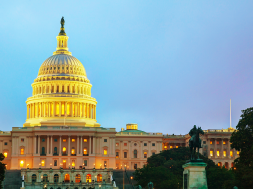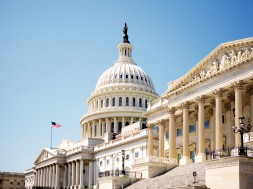
Outlook for Career Education During the Biden/Harris Administration
By Robert M. Keiser, Executive Director, Southeastern College
The United States of America has survived the presidential election and the onslaught of negative political ads and banter on social media sites. Pending an unlikely legal election overturn in the wake of the Trump administration’s multiple lawsuits, Joe Biden (D) is the President-elect, and Kamala Harris (D) the Vice President. As the political pendulum swings once again, what is in store for a postsecondary education sector that is so profoundly impacted by federal politics?
Georgia Senate runoffs
Much of the future for career education hangs in the balance as the nation’s collective attention turns to Georgia where Kelly Loeffler (R) and David Perdue (R) face off against Democrat challengers Rev. Raphael Warnock (D) and John Ossof (D) after none of the aforementioned candidates received 50% of the vote this past November.
The Republican party currently holds 50 seats in the Senate as compared to the Democrats 48. If Democrats win both runoffs, then Vice President Harris would be able to cast the deciding vote in the legislature’s upper chamber.
As control of the Senate majority hangs in the balance, so does the fate of postsecondary career education.
Most likely scenario
The most likely scenario is that Joe Biden (D) and Kamala (Harris) assume their elected positions as President and Vice President. The Georgia runoffs break for the Republicans, and the Republicans maintain their slim Senate majority. The House of Representatives will stay with the Democrats, and the Democrats will maintain a much slimmer majority than before. If these scenarios play out, then the Biden/Harris administration will be forced to compromise, something Biden is known for, with Senate Republicans and likely House Republicans because the Democratic majority is so slim in the House and the party is split ideologically between moderates and progressives. A Republican hold of the Senate means that reauthorization of the Higher Education Act is highly unlikely. It also likely means that the most aggressive actions against the career education sector will not be done legislatively but through regulatory action.
Biden’s election win provides him the ability to select the new Secretary of Education. Biden’s selection will likely be an individual who is friendly to community colleges, HBCUs, and public land-grant universities and less friendly to for-profit colleges and universities. As for specific policies, it is expected that regulations such as Gainful Employment and Borrower’s Defense to Repayment, Title IX, and DACA and the Dreamers Act will come back and/or will reflect the Obama administration’s policies more closely. It is also expected that a policy such as doubling Pell grant awards will happen as it is less controversial and embraced more universally. Some of the more lofty or controversial policy aspirations include free community college, free public college and university for those making $125,000 or less, new repayment rate regulation, new regulations holding for-profit owners and administrators accountable for student debt, a creative approach to moving the needle to 85/15, and widespread loan forgiveness.
Less likely scenario
The less likely scenario, and one that might be considered a doomsday scenario for the career education sector, is if both Republicans lose their Georgia Senate runoffs. Through Harris, Democrats would control the Senate. This control makes lasting, legislative action much more likely. It can be assumed that Democrats tasked with postsecondary education would rush to reauthorize the Higher Education Act. This reauthorization would likely include policies that would be adversarial to the for-profit sector and, due to their legislative nature, very hard to overturn even with a different outcome in future elections. Of course, if the Democrats are unable to push some of the more aggressive policies in the reauthorization of H.E.A., they would likely push it through regulation via the Department of Education.
Career education sector
Whether Republicans maintain control of the Senate or not, it is evident that the career education sector/for-profit sector faces a much tougher landscape than the one provided by the Trump administration. It is likely that the Biden/Harris administration is likely to reflect the Obama administration’s policies and could be more adversarial. Harris has regularly and proudly touted her experience bringing down Corinthian Colleges while acting as California’s attorney general. As part of his education platform, Joe Biden mentioned that predatory for-profit colleges would be held accountable during his tenure.
Furthermore, many of the sector’s opponents who were surprised by a Trump victory have lamented the missed opportunity of regulating the sector more and look at the Biden/Harris administration as a chance to correct past missteps.
Challenges to accreditation, such as the status of ACICS and the questioned efficacy of accreditation as Title IV gatekeepers, may provide new challenges to the sector. President Obama is famously quoted as saying, “elections have consequences,” which is more true today than ever before in a political environment characterized by complete polarization. The Biden/Harris election will result in a more liberal education policy agenda and increased oversight of for-profit colleges and universities. If the sector is to survive and remain a part of the higher education canvas, the sector will have to continue to produce positive educational outcomes, avoid scandal, invest in compliance, and curry favor with Democrats who may be more understanding of the sector’s value.
ROBERT KEISER raised in Fort Lauderdale, Florida, has lived in Washington D.C. and Barcelona, Spain but now resides full-time in Delray Beach, Florida. Robert holds a Bachelor’s of Science, as well as a Master of Business Administration (M.B.A.) from The George Washington University in Washington D.C. Robert is also currently pursuing a Ph.D. in Higher Education Leadership from Capella University.
Robert Keiser currently serves as the Executive Director of Southeastern College was previously the Campus President of Southeastern College’s West Palm Beach Campus. Robert Keiser previously worked at Keiser University’s Fort Lauderdale, West Palm Beach, and Port St. Lucie campus. During his experience with Keiser and Southeastern, Robert has worked in admissions, financial aid, academics, and governmental relations. Robert serves as the President-Elect for the Florida Association of Postsecondary Schools and Colleges and as a member of the Rules and Accreditation Committees for the Commission of Independent Education. Before his time in Higher Education, he worked for U.B.S. Financial Services in wealth management and Skanska U.S.A., construction management, in business development.
Contact Information: Robert M. Keiser, M.B.A. // Executive Director // Southeastern College // 954-261-5135 // rkeiser@sec.edu // www.sec.edu











